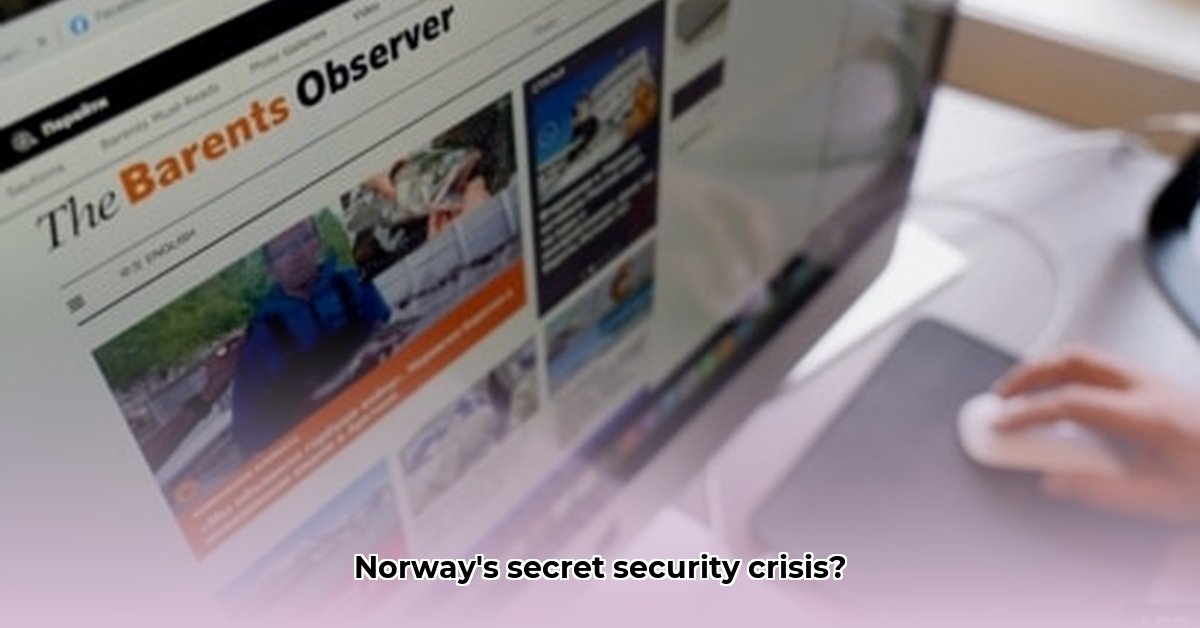Norway’s security landscape is undergoing a significant transformation, demanding a comprehensive and proactive approach to address emerging vulnerabilities. From funding shortfalls within police forces to the intricate balance of international intelligence sharing and the rising threat of sabotage, Norway faces complex challenges that necessitate immediate action and long-term strategic planning. This article examines these critical issues and proposes actionable solutions to fortify the nation’s security posture.
Funding the Front Lines: Bolstering Police Resources
Recent reports from Norwegian news outlets highlight a concerning gap in funding for police forces, impacting their ability to effectively combat the rise in diverse criminal activities. Adequate resourcing is not merely a budgetary concern; it’s a fundamental investment in public safety. Increased funding is crucial to recruit and retain qualified officers, equip them with modern tools and technology, and provide comprehensive training to meet evolving challenges. Without sufficient investment, response times will lag, investigations will be hampered, and public trust in law enforcement may erode. A detailed assessment of current resource allocation and future needs is essential to ensure that Norway’s police forces are equipped to protect its citizens.
Navigating the Intelligence Labyrinth: Balancing Cooperation and Sovereignty
International intelligence sharing, particularly with the United States, plays a vital role in Norway’s national security. However, this collaboration must be carefully managed to protect Norway’s sovereign data and prevent potential misuse. Clear protocols and robust oversight mechanisms are necessary to ensure that shared information is utilized responsibly and ethically, while maintaining control over sensitive national intelligence. Striking this delicate balance is crucial to leverage global partnerships effectively without compromising national interests. A transparent framework for intelligence sharing will build public trust and strengthen international cooperation.
Safeguarding Critical Infrastructure: Preventing Sabotage in a Digital Age
The increasing interconnectedness of critical infrastructure, including energy pipelines and undersea communication cables, creates new vulnerabilities to sabotage. The Norwegian Police Security Service (PST) has acknowledged the need for enhanced surveillance technologies and updated legal frameworks to address these threats. Protecting these vital assets requires a multi-faceted approach, encompassing technological upgrades, robust cybersecurity measures, and strengthened physical security protocols. Regular vulnerability assessments and penetration testing are essential to identify and mitigate weaknesses before they can be exploited. Investing in preventative measures and proactive threat detection is paramount to safeguarding Norway’s national interests.
Combating Digital Deception: Addressing the Rise of Phone Scams
Phone scams continue to plague Norway, exploiting vulnerabilities and eroding public trust. Combating this pervasive threat requires a dynamic and adaptable approach. Data-driven analysis of scam patterns and tactics is crucial to inform effective countermeasures. Public awareness campaigns must be continuously updated to educate citizens about evolving scam techniques and empower them to protect themselves. International cooperation is essential to track down perpetrators and dismantle criminal networks operating across borders. A comprehensive strategy that combines prevention, enforcement, and public education is vital to mitigate the impact of phone scams.
The Evolving Role of the Military: Responding to Non-Traditional Threats
The Norwegian armed forces are increasingly involved in non-traditional security operations, such as responding to national emergencies and natural disasters. This expanding role necessitates enhanced inter-agency coordination, streamlined communication protocols, and optimized resource allocation across government departments. Joint training exercises and simulations are essential to ensure seamless cooperation and effective responses in crisis situations. A clear framework outlining the military’s role in non-traditional security operations is crucial to avoid overlaps in responsibilities and maximize the impact of their contribution.
A Strategic Roadmap for Enhanced Security: Investing in Norway’s Future
Addressing Norway’s evolving security challenges requires a dual approach: immediate, targeted actions and a comprehensive long-term strategy. Investing in the following areas is crucial to fortify the nation’s security posture:
- Increased Police Funding and Training: Allocate significantly more resources to police forces, equip them with modern technology, and provide specialized training to address complex crimes.
- Enhanced Surveillance and Cybersecurity Capabilities: Invest in advanced surveillance technologies, strengthen cybersecurity infrastructure, and implement robust data protection measures.
- Strengthened Anti-Phone Scam Initiatives: Develop data-driven countermeasures, launch targeted public awareness campaigns, and foster international cooperation to dismantle criminal networks.
- Improved Inter-Agency Coordination and Communication: Establish clear protocols for information sharing and joint operations between government agencies, including the military and law enforcement.
- Modernized Legal Frameworks: Update existing laws to address emerging threats, such as cybercrime and sabotage, while upholding civil liberties and ensuring transparency.
- Proactive Threat Detection and Prevention: Invest in predictive policing technologies, conduct regular vulnerability assessments, and develop proactive strategies to mitigate risks before they materialize.
- Long-Term National Security Strategy: Develop a comprehensive, adaptable national security strategy that outlines clear goals, priorities, and resource allocation for the future.
By prioritizing these investments and fostering a culture of proactive security, Norway can effectively address its evolving security challenges and safeguard its future. A robust and adaptable security posture is essential to protect its citizens, critical infrastructure, and national interests in an increasingly complex world.
- Unlock Filipino Culture: A Deep Dive into Traditions and Practices - April 23, 2025
- Unlock Spanish Culture: Insights & Opportunities Now - April 23, 2025
- White Spirit Uses & Substitutes: A Deep Dive for Pros & DIYers - April 23, 2025
















